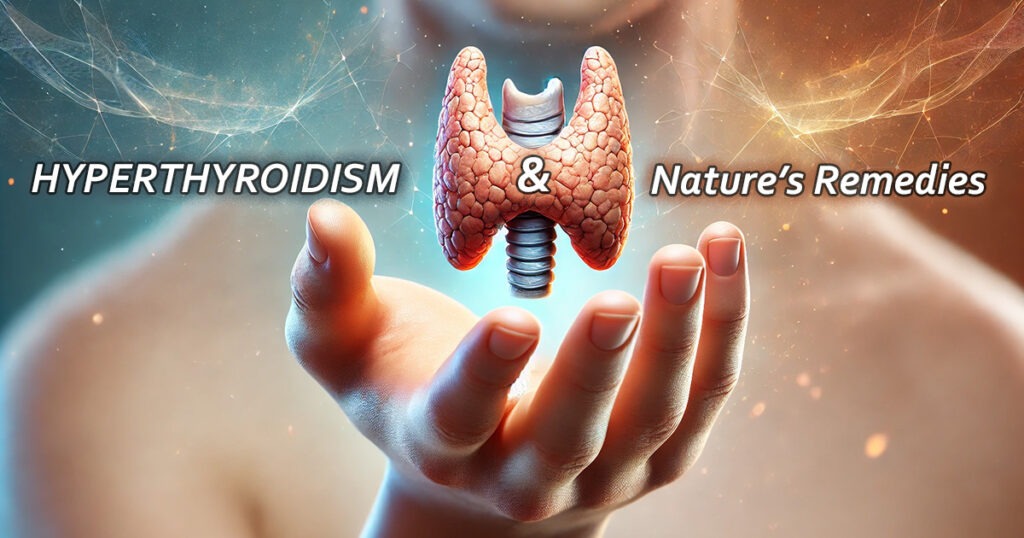The Woes of Hyperthyroidism & Nature’s Remedies

Are you feeling unusually anxious, jittery, or experiencing rapid weight loss despite an increased appetite? These could be signs of hyperthyroidism, a condition that speeds up your metabolism and affects nearly every part of your body.
The culprit behind this condition is the thyroid gland, a small, butterfly-shaped gland located in the neck, nestled in front of the trachea and below the larynx. This gland plays a crucial role in controlling your body’s metabolism by producing essential hormones.
This article will delve into hyperthyroidism, exploring its causes, symptoms, treatments, and natural remedies to help you understand and manage this challenging condition.
What is Hyperthyroidism?
Hyperthyroidism, also known as overactive thyroid, affects a little more than 2 out of every 100 women. It is a condition that occurs when the thyroid gland produces too many thyroid hormones. Thyroid hormones control how the body uses energy, affecting almost every organ. Hyperthyroidism speeds up the body’s metabolism, which can cause many symptoms such as:
- Mood swings
- Anxiety and irritability
- Feeling jittery
- Weight loss despite increased appetite
- Rapid or irregular heartbeat
- Nervousness, irritability, trouble sleeping, fatigue
- Shaky hands, muscle weakness
- Sweating or trouble tolerating heat
- Frequent bowel movements
- Thinning of the skin
- Fine, brittle hair
- High blood pressure
- Fever
- Decreased alertness
- Abdominal pain
- Difficulty breathing
- Sore throat
- Painful swallowing
- Generalized aches
Causes of Hyperthyroidism
The most common cause of hyperthyroidism is Graves’ disease. In this autoimmune disease, the thyrotropin receptor causes an overproduction of the thyroid hormones. Other causes of hyperthyroidism include:
- Plummer’s disease (toxic goiter)
- Thyroid or pituitary tumors
- Thyroiditis (inflamed thyroid)
- Excess iodine intake
Treatment for Hyperthyroidism
Mild hyperthyroidism may improve on its own without treatment, but in most cases, symptoms will worsen. Traditional treatments include anti-thyroid medicine, beta-blockers, radioiodine therapy, and thyroidectomy. Please consult your medical provider for more information regarding these traditional methods. This article focuses on natural remedies to combat hyperthyroidism.
Natural Remedies for Hyperthyroidism
Before I proceed with natural remedies, this information does not replace any medical advice you may have received from your medical provider. Because your cells and tissues need vitamins and minerals to rejuvenate, addressing mineral deficiencies and maintaining a proper diet are the first pathways for treating or reversing hyperthyroidism.
When your thyroid is over-producing hormones, your entire body can become depleted of nutrients. Some of the most common nutrients needed for this disorder are as follows:
Mineral Deficiencies Due to Hyperthyroidism
- Vitamin D: Research suggests that individuals with Graves’ disease are more likely to have a vitamin D deficiency than the general population. Vitamin D supplementation may help reduce relapse rates in those receiving treatment for Graves’ disease.
- Selenium: Selenium deficiency can increase the risk of Graves’ disease.
- Bugleweed: Bugleweed inhibits the binding of antibodies to the thyroid gland.
- Motherwort: Motherwort (Leonurus cardiaca) may help regulate rapid heartbeat, a common symptom of hyperthyroidism. DO NOT take motherwort along with sedating medications, including some antihistamines. Motherwort can potentially cause miscarriage and increase uterine bleeding.
- Vitamin B12: If you have hyperthyroidism, chances are you also have a vitamin B-12 deficiency as well. Vitamin B-12 deficiency can lead to feelings of fatigue, weakness, and dizziness. If you have a vitamin B-12 deficiency, consult your doctor about taking a B-12 supplement or getting a B-12 injection.
- Carnitine: Hyperthyroidism can deplete the body’s carnitine stores, which are essential for energy production. A 2001 study suggests that L-carnitine may be able to reverse and prevent hyperthyroidism symptoms like tremors, fatigue, and heart palpitations. However, more studies are needed to confirm its effectiveness.
- Omega-3 fatty acids: Omega-3 fatty acids, such as fish oil, can help reduce inflammation and boost immunity. However, they can also have a blood-thinning effect, so you should speak to your doctor before taking them if you take blood-thinning medications.
Foods to Avoid
Foods rich in iodine can exacerbate hyperthyroidism because the thyroid gland uses iodine to produce hormones. Consuming too much iodine can cause the thyroid to make too much thyroid hormone, which can worsen hyperthyroidism. Foods that are rich in iodine include:
- Table salt or iodized salt
- Seafood such as oysters, shrimp, codfish, seaweeds, sea kelp
- Tuna
- Beef liver
- Eggs
- Dairy products
- Processed foods (may contain added iodine, trans fatty acids, and substances that increase inflammation)
- Gluten (can trigger an immune system response similar to thyroid cells)
- Sugar (can cause blood sugar levels to spike, leading to palpitations and an increased heart rate)
Foods That Can Help Combat Hyperthyroidism
- Foods rich in selenium: Iodine needs selenium for proper synthesis into thyroid hormone. Having the right amount of selenium in your diet is vital for preventing thyroid disease and overall health. Selenium deficiency also impairs thyroid hormone metabolism. Foods that are rich in selenium include:
- Pumpkin seeds
- Brazil nuts
- Chia seeds
- Cottage cheese
- Bananas
- Lentils
- Eggs
- Lean meats
- Fish
- Foods rich in zinc: Zinc helps the thyroid produce and metabolize hormones essential for the body’s regular metabolism and resting metabolic rate. Foods that are rich in zinc include:
- Pumpkin seeds
- Cashews
- Chickpeas
- Beans
- Eggs
- Lentils
- Beef
- Healthy fats: Anti-inflammatory fats are essential for those with hyperthyroidism. These include omega-3 fatty acids (found in fatty fish such as salmon), unprocessed fats (from whole foods), and nondairy fats (like flaxseed oil, olive oil, avocado oil, coconut oil, avocado, and unsalted nuts and seeds).
- Cruciferous vegetables: Some cruciferous vegetables, such as Brussels sprouts, kale, cauliflower, and cabbage, contain compounds that decrease thyroid hormone production and may reduce iodine uptake by the thyroid.
- Protein: These complex and vital molecules can benefit people with hyperthyroidism by helping release hormones that control appetite and boost metabolism, aiding in weight maintenance, and supporting bone health. Good protein sources include nuts, chia seeds, flax seeds, fish, chicken, tofu, and lentils.
- Fruits: Antioxidant-rich fruits like strawberries, blueberries, raspberries, kiwifruit, tomatoes, and citrus help strengthen the body’s immune system and support thyroid hormone balance.
- Electrolytes: Electrolytes are vital for fluid balance, nerve conduction, and muscle contractions. Staying hydrated and replenishing electrolyte levels can help alleviate symptoms associated with thyroid conditions.
- Probiotics: Probiotics help rebalance the gut microbiome, reduce gut inflammation, and may improve hyperthyroid symptoms, including anxiety.
Other Considerations for Healthy Thyroid Function
Stress Reduction
According to Dr. Michael Ruscio, DC, naturopathic practitioner and adjunct professor at the University of Bridgeport, stress reduction is good supportive care for hyperthyroidism. While there is no direct evidence that stress reduction practices can improve Graves’ disease or hyperthyroidism, activities like meditation, yoga, or cognitive behavioral therapy can support your healing process.
Adrenal Function
Dr. Jolene Brighten, a certified naturopathic endocrinologist, emphasizes the close relationship between adrenal and thyroid function. Reducing stress and taking care of your adrenals can make a significant difference in managing hyperthyroidism. She suggests creating a bedtime routine that helps you unwind, such as enjoying a book, taking a bath, meditation, or gentle stretching.
Lymphatic Health
Your lymphatic system is responsible for removing waste and toxins from your body. Steps to improve your lymphatic health include:
- Moving your body
- Rebounding
- Dry brushing
- Lymphatic massages
Takeaway
Hyperthyroidism involves numerous symptoms and can be challenging to live with. Understanding how your body functions is essential to learning how to reverse or prevent illness. This disease can be manageable or reversible with some discipline and lifestyle changes. Your outcome depends on your willingness and drive to incorporate the suggested changes into your lifestyle.
If you found this article helpful, please share it with someone who might benefit. Until next time, take care of yourself, and happy healing!
Related Links
The Power of Human Glands: How They Impact Your Health
Navigating Your Daily Protein Needs: How Much is Enough?
